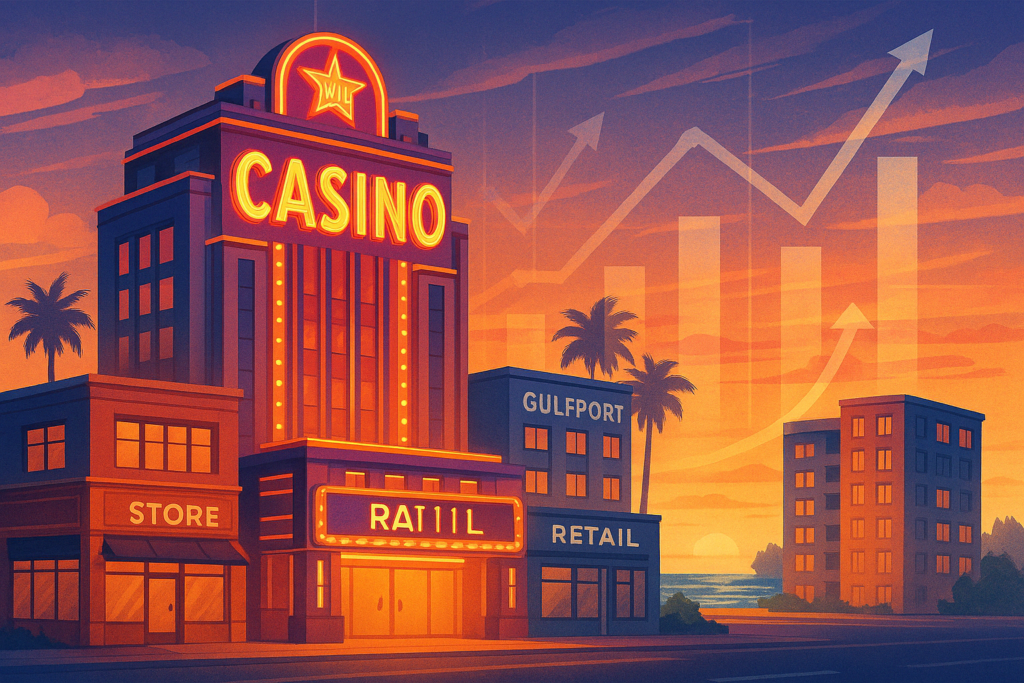
It’s no secret that the casino industry is a cornerstone of the Mississippi Gulf Coast economy. From Biloxi to Gulfport to Bay St. Louis, casino resorts are not just destinations for tourists—they’re powerful economic engines that ripple across our commercial real estate (CRE) landscape. If you own retail or multifamily property anywhere near a major gaming hub along the Coast, then the trends shaping casino operations are also shaping your property’s value, potential income, and long-term strategy.
Let’s explore exactly how the casino industry impacts MS Gulf Coast commercial real estate—and what current property owners need to be paying close attention to.
The Mississippi Gulf Coast casino market is unique in that it isn’t just built around one destination. It’s a string of gaming properties—over a dozen strong—each contributing to a robust and growing regional economy. According to the Mississippi Gaming Commission, Coast casinos generated over $1.6 billion in gross gaming revenue in 2023 alone. Those dollars don’t just stay on the gaming floor. They support thousands of jobs, attract millions of tourists, and catalyze surrounding economic development.
When tourism flows, everything else flows with it—restaurant demand spikes, retail sales climb, and nearby apartment units see higher occupancy. But that’s just the surface.
Not every shift in the casino industry bodes the same impact. Some trends create tailwinds for CRE owners; others signal it’s time to re-evaluate your investment strategy.
One of the most important recent trends is the rise of non-gaming revenue. Today’s Gulf Coast casinos are competing less on the slot floor and more with fine dining, entertainment, retail, and hospitality experiences. When a casino adds a new show venue, high-end restaurant, or retail component, it’s not just the resort that benefits. Foot traffic increases, visitors linger longer, and surrounding commercial properties get a boost in visibility and consumer spend.
That’s a win for nearby strip centers, freestanding retailers, and even service providers like salons and clinics that benefit from higher daily traffic counts. And the uptick isn’t just anecdotal—it’s measurable. A well-positioned retail center within a quarter mile of a performing casino can see rental premiums of 10-20% compared to similar centers farther removed.
But there’s another side to this coin.
There are times when the casino’s success may actually highlight an owner’s inefficiency. If your multifamily or retail asset is close to a high-performing resort and you haven’t seen a rent increase or NOI growth in the last few years, that may not be a market problem—it may be a property problem.
This is where tracking Return on Equity (ROE) becomes critical. If your property’s value has risen thanks to its proximity to a thriving casino district, but your income has stayed flat, your ROE could be declining. Speaking In practical terms, that means your money is working less efficiently today than it was five years ago.
In my office, we routinely analyze ROE for property owners in Biloxi and Gulfport who’ve held a property for a decade or more. In many cases, the asset has appreciated, but the owner’s yield has not. That’s a sign it may be time to either refinance or exchange the property for one that offers stronger returns. Usually into something with less risk and lower management demands.
Casino trends also strongly influence the multifamily market on the Coast—especially in the workforce housing category. Each major resort employs hundreds, sometimes thousands, of workers. When a casino expands or a new one opens, those workers need somewhere to live.
That demand often materializes within a few miles of the property, and that proximity carries real value. However, many small-to-mid-size multifamily owners don’t realize that the casino doesn’t just boost occupancy. It also impacts renewal rates, rental trends, and tenant quality. In areas like D’Iberville and West Biloxi, properties with strong access to major employment hubs see lower turnover and more stable income over time.
And as newer, amenitized apartment complexes come online, older properties that don’t modernize may lose their edge—despite prime location. In those cases, the smart move may be to reposition, reinvest, or consider a 1031 exchange into a better-performing asset.
It’s not just about what the casino industry is doing—it’s about how it intersects with broader market shifts. Inflation, insurance premiums, and interest rate movements all affect the decision to hold or sell commercial property. But for Gulf Coast owners near casino zones, those macro pressures are magnified by micro-locational dynamics.
Let’s say you own a retail strip center in East Biloxi, less than a mile from a resort that’s just announced a multimillion-dollar expansion. On paper, that sounds great. But what if your leases are below market? What if your tenants are month-to-month or your deferred maintenance is dragging down your cap rate? Now you’re sitting on an asset that’s appreciating externally but underperforming internally. That’s the moment to bring in a CRE broker who knows this market, understands these forces, and can help you run the right numbers.
At The Molyneaux Group, we’ve helped owners in precisely this position unlock trapped equity, boost their yield, and execute clean transitions into higher-performing investments—whether through traditional sales, 1031 exchanges, or strategic refinances.
So, how do you know when it’s time to sell? Here’s one rule of thumb I’ve shared with many local property owners: when your property’s appreciation has outpaced its income growth by more than 20% over a 5-year period, it’s time to take a closer look.
The casino industry has created tremendous upside along the Mississippi Gulf Coast. But not every property has capitalized on it. Some have simply ridden the wave without making the changes needed to sustain returns. That’s where strategic ownership makes all the difference.
The casino industry’s impact on MS Gulf Coast commercial real estate is undeniable. It affects property values, rent growth, tenant mix, and long-term investment strategy. Whether you’re holding multifamily near employment hubs or retail property along high-traffic corridors, the opportunities—and risks—are real.
The key is knowing how to interpret the signals.
At The Molyneaux Group, we help property owners evaluate whether their commercial asset is performing at its full potential or if it’s time for a pivot. If your property is in the shadow of a thriving casino, it may be time to put your equity to work in a more efficient way. Let us help you analyze your ROE, explore 1031 exchange options, and position your portfolio for the next chapter.
Ready to start the conversation? Visit our Contact Page, or learn more about Our Services to see how we help investors just like you make smarter real estate decisions on the Mississippi Gulf Coast.
Additional Resources:
Mississippi Gaming Commission - Monthly Revenue Reports
What Is a 1031 Exchange? – Investopedia
Author Bio:
Grey Molyneaux is a commercial real estate agent specializing in seller representation on the Mississippi Gulf Coast. With a strong background in sales and marketing, he helps property owners maximize their real estate investments through strategic marketing. Grey is also a dedicated husband, father, and musician, balancing his professional expertise with his creative passions.

(228) 278-6616
grey@molyneauxgroup.com